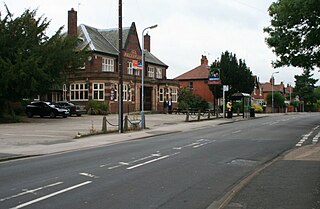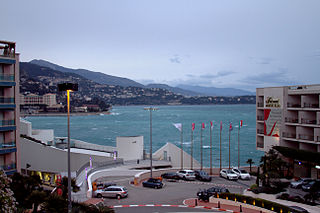Trespass is an area of tort law broadly divided into three groups: trespass to the person, trespass to chattels, and trespass to land.
Adverse possession in common law, and its related civil law concept acquisitive prescription, are legal mechanisms under which a person who does not have legal title to a piece of property, usually real property, may acquire legal ownership based on continuous possession or occupation without the permission (licence) of its legal owner.
A profit, in the law of real property, is a nonpossessory interest in land similar to the better-known easement, which gives the holder the right to take natural resources such as petroleum, minerals, timber, and wild game from the land of another. Indeed, because of the necessity of allowing access to the land so that resources may be gathered, every profit contains an implied easement for the owner of the profit to enter the other party's land for the purpose of collecting the resources permitted by the profit.

Gerald Ritchie Upjohn, Baron Upjohn, CBE, PC, DL was a British soldier and judge.

Sturges v Bridgman (1879) LR 11 Ch D 852 is a landmark case in nuisance decided by the Court of Appeal of England and Wales. It decides that what constitutes reasonable use of one's property depends on the character of the locality and that it is no defence that the plaintiff "came to the nuisance".
Baylis v. Travelers' Insurance Company, 113 U.S. 316 (1885), was a case where after close of testimony in a trial, the defendant moved to dismiss on the ground of the insufficiency of the evidence to sustain a verdict. This motion was denied and the plaintiff asked that the case be submitted to the jury to determine the facts on the evidence. The court refused this, and plaintiff excepted. The court then ordered a verdict for plaintiff, subject to its opinion, whether the facts proved were sufficient to render defendant liable to plaintiff on the cause of action stated. Plaintiff moved for judgment on the verdict, and defendant moved for judgment on the pleadings and minutes of trial. Judgment was rendered for defendant upon an opinion of the court as to the effect of the evidence and as to the law on the facts as deduced from it by the court. Held that the plaintiff was thereby deprived of his constitutional right to a trial by jury, which he had not waived, and to which he was entitled.

Re Ellenborough Park[1955] EWCA Civ 4 was an English land law case which reformulated the tests for an easement. It found an easement to use a communal garden to be a valid easement in law. There is no requirement for all of the houses to be immediately next to the garden to benefit from it.
Robert Francis Brachtenbach was an American politician and jurist from the state of Washington.
An easement is a nonpossessory right to use and/or enter onto the real property of another without possessing it. It is "best typified in the right of way which one landowner, A, may enjoy over the land of another, B". An easement is a property right and type of incorporeal property in itself at common law in most jurisdictions.
The English law of unjust enrichment is part of the English law of obligations, along with the law of contract, tort, and trusts. The law of unjust enrichment deals with circumstances in which one person is required to make restitution of a benefit acquired at the expense of another in circumstances which are unjust.

Thomas Haslem v. William A. Lockwood, Connecticut, (1871) is an important United States case in property, tort, conversion, trover and nuisance law.

Wheeldon v Burrows (1879) LR 12 Ch D 31 is an English land law case confirming and governing a means of the implied grant or grants of easements — the implied grant of all continuous and apparent inchoate easements to a transferee of part, unless expressly excluded. The case consolidated one of the three current methods by which an easement can be acquired by implied grant.
Moncrieff v Jamieson [2007] UKHL 42 is a Scottish property law case decided by the House of Lords on servitudes.
Easements in English law are certain rights in English land law that a person has over another's land. Rights recognised as easements range from very widespread forms of rights of way, most rights to use service conduits such as telecommunications cables, power supply lines, supply pipes and drains, rights to use communal gardens and rights of light to more strained and novel forms. All types are subject to general rules and constraints. As one of the formalities in English law express, express legal easements must be created by deed.

London and Blenheim Estates Ltd v Ladbroke Retail Parks Ltd [1993] 4 All ER 157 is an English land law case, concerning easements. It persuasively confirmed for one of the first times, obiter, that parking a car on land on its own could be the appropriate subject matter for an express easement. It established that an arrangement for a future extension of easement rights over specific other land would require a specific parcel of dominant land too. Simply agreeing that wherever any dominant land is extended the easement on the servient land will be extended is insufficient.

Das v Linden Mews Ltd[2002] EWCA Civ 590 is an English land law case, concerning rights of way.

Halsall v Brizell [1957] Ch 169 is an English land law case, concerning the enforceability of a positive covenant, that is required positive obligations, in this case the obligation to pay money for upkeep and repair.

Bass v Gregory (1890) is an English tort law and English land law case, concerning a ventilation shaft on under or through adjoining land. It was deemed an easement by prescription, having been used without long interruptions for forty years. At the time of the case, the law, and the leading judge made a fine technical distinction between prescription by statute and by the common law doctrine of lost modern grant.

FHR European Ventures LLP v Cedar Capital Partners LLC[2014] UKSC 45 is a landmark decision of the United Kingdom Supreme Court which holds that a bribe or secret commission accepted by an agent is held on trust for his principal. In so ruling, the Court partially overruled Sinclair Investments (UK) Ltd v Versailles Trade Finance Ltd in favour of The Attorney General for Hong Kong v Reid (UKPC), a ruling from the Judicial Committee of the Privy Council on appeal from New Zealand.

Mellor v Spateman (1669) 1 Wm. Saund. 339, is an English common law trespass case heard in the Court of King's Bench where it was held that a corporation may prescribe to have a common of pasture. In relation to cattle levant and couchant within the town, a corporation may prescribe for common in gross, but not for common in gross without number.











